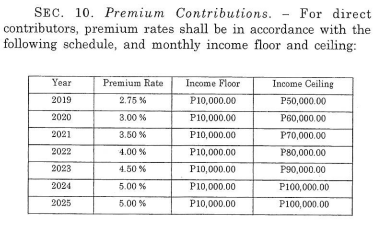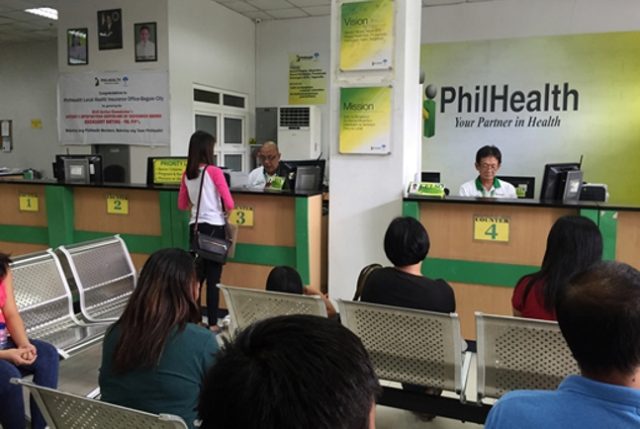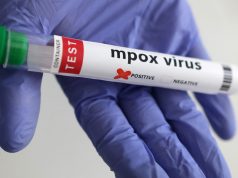President Rodrigo Duterte ordered the delay of the state insurer’s contribution hike despite it being part the law he signed in 2019.
Last week, the Philippine Health Insurance Corporation or PhilHealth announced that it would proceed with the scheduled contribution rate adjustment for 2021 amid the still unresolved corruption woes.
READ: Voluntary contribution sought as PhilHealth announces scheduled hike
The adjusted rate will supposedly require members to pay 3.5% more in premium contributions every month from the 3% in 2020.
Following criticisms from the public and some lawmakers, Duterte in his televised address that aired on January 4, recommended the deferment of the PhilHealth contribution hike.
“At this time of our life, may I just suggest to the PhilHealth chairman, si Dante Gierran at saka ‘yung si — lahat na — isang tao lang kailangan kong sabihan diyan. Huwag muna ngayon. No — no increase in contributions,” Duterte said.
“I will look for the money to fill it up. Maghanap tayo ng pera. Anyway, that is the job of the government to make it easy for everybody at this time, I said, of our lives. Inabutan tayo nito which was once in every century lang siguro ‘to, hindi pa nga,” he added.
Sen. Bong Go, former presidential aide, said that Duterte’s directive was due to the current economic crisis amid the still raging novel coronavirus pandemic.
“Pandemic tayo ngayon, trabaho ng government humanap ng paraan and to make easy for the people,” the senator said.
Before Duterte’s recommendation, some lawmakers also eyed to file a resolution that would suspend the increase of PhilHealth contribution until 2022 in light of the health crisis.
Duterte, however, signed the law that mandated these additional fees—the Republic Act 11223 or the Universal Health Care Law.
Revisiting the UHC Law
The UHC Act was signed into law in February 2019. It seeks to provide Filipinos “equitable access to quality and affordable health care goods and services, and protected against financial risk.”
Health Secretary Francisco Duque III also signed the legislation’s implementing rules and regulations in October of that year.
This health act guarantees that all Filipinos are PhilHealth members and entitled to free medical services delivered either as “population-based” or “individual-based” health services.
However, direct contributors to the state insurer are still required to pay additional contributions to avail of these benefits.
The table of increases per year for direct contributors is provided in the Section 10 of the UHC Law.

Gierran, in response to calls for the deferment of contribution hike, noted this and stated that Congress should be the one to pass a law to amend the new UHC law’s provisions.
“The interim arrangement will be good until Congress is able to pass a new law allowing the deferment,” Gierran said.
“Should there be no new legislation passed for this purpose, the state health insurer will proceed with the scheduled premium rate and ceiling,” he added.
In an interview with CNN Philippines, PhilHealth Spokesperson Rey Baleña added that the state-run corporation has no authority to change the law.
“Batid na batid ng PhilHealth, at lubos na nauunawaan po ng ahensiya ang kasalukuyang situation ng marami nating kababayan, at yung sitwasyon ng maraming negosyo. Ngunit…wala sa kapangyarihan ng PhilHealth na hindi po ipatupad ang itinatadhana ng batas. Wala tayong authority para hindi ito iimplement,” said Baleña.
A tactic to make him a hero?
Amid the outrage over the scheduled contribition hike, some Filipinos speculated that Duterte’s latest directive to PhilHealth might be a “public relations tactic” to paint a good image out of his administration.
Some Facebook users also criticized the suspension of the contribution hike and said that it is only a temporary solution to the billions worth of funds that PhilHealth executives allegedly stole.

One Facebook user speculated that Duterte and his allies might be saving face due to the coming elections in 2022.

This was not the first time that PhilHealth’s new adjustment rates drew outrage among its members.
Last May, the increase the OFWs’ mandatory contribution to 3% of their monthly salary for 2020 drew criticisms among OFWs and labor groups.
READ: ‘Put the Palace order on paper’: OFWs protest vs hike in PhilHealth premium payment continues
Duterte later ordered to make OFW PhilHealth contributions voluntary.










